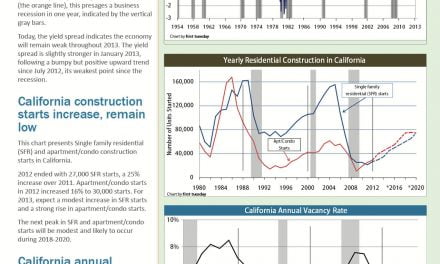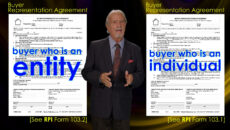This article examines the rules and ramifications of recently passed mortgage loan broker legislation for California loan brokers and agents.
First, the highlights:
- Endorsement is only required for those DRE licensees—brokers and agents—who will, after 2010, make, arrange, or receive fees for the origination of loans controlled by the Real Estate Settlement and Procedures Act (RESPA loans). RESPA loans include purchase-assist loans, refinancing of single family owner-occupied residences (SFRs) and consumer-purpose equity loans.
- No education is required to obtain the endorsement if you already have a DRE license. Some licensees who seek endorsement may want to study for the government exams, but are not required to do so.
- To become endorsed, Brokers and Agents must first register with the Nationwide Mortgage Licensing System and Registry (NMLS) at mortgage.nationwidelicensingsystem.org. They must also apply for and pass two government exams through the NMLS website (a state and a federal exam).
- The application for endorsement must be submitted to the NMLS, by August 31, 2010. Both exams must be passed, and fingerprints must be submitted, by September 15th.
- The total fees for license endorsement are $521 payable to the NMLS. The fees include:
- a $300 endorsement fee (not $15, as stated on the DRE website) and a $60 processing fee, both paid to the NMLS upon registration for endorsement; and
- a fee of $92 for the federal exam and $69 for the state exam, both paid to the NMLS with the applications to take the exams.
- Every aspect of this RESPA endorsement, registration and exam process is handled and coordinated by the NMLS: the DRE never needs to be contacted, since brokers and agents never deal directly with the DRE in the endorsement process. Much of the information on this process currently listed on dre.ca.gov is either out of date or just plain wrong.
For more detailed information on the endorsement process, look below.
Brokers and agents arranging consumer loans on one-to-four residential units must be endorsed and registered by January 1, 2011
New loan broker requirements imposed by California’s legislature will profoundly change the business activities of all real estate brokers and agents who arrange RESPA-type consumer loans (loans issued to homebuyers for the purchase of residential property) secured by one-to-four residential units, called mortgage loan originators, and to a very limited extent, mortgage loan brokers arranging business, investment or agricultural loans secured by one-to-four residential units.
On or before January 31, 2010, or 30 days after they begin first acting as a loan broker or agent, real estate brokers and agents arranging loans for any purpose secured by a one-to-four unit residential property must notify the DRE of their loan origination activities. This notification can now be made online with Form RE 866: Mortgage Loan Activity Notification. Note: DRE publications state all brokers and agents who originate loans on any type of property are required to register with Form RE 866, or face a fine of $50 per day. This is not entirely accurate. While there certainly is no harm in completing the easy and free registration process, only brokers and agents who originate loans on one-to-four unit residential property are really required to register, and only they will be subject to the extensive fines if they fail to do so. [Calif. Business and Professions Code §s 10166.02 and 10166.07]
Also, on or before January 1, 2011, those real estate brokers and their agents licensed by the California Department of Real Estate (DRE) who originate consumer purpose loans secured by one-to-four unit residential property, but not business or investment purpose loans, will be required to obtain a license endorsement from the NMLS. All steps in the application for this endorsement, including exams, must be completed by August 15, 2010.
The first step in this endorsement process is to register with NMLS . The specific registration forms for real estate brokers (MU1, MU2, and MU4) are now available here. The application process will also include fingerprinting, and designated live-scan fingerprinting locations will be made available to applicants during the online application process. Detailed directions on the application for endorsement are available here.
Please keep in mind that registration with the NMLS, and rest of the DRE license endorsement process, is not required for MLBs who make or arrange business loans secured by one-to-four unit residential property or any other type of property, or any other type of loan not regulated by the Real Estate Settlement Procedures Act (RESPA) and the Truth in Lending Act (TILA).
Once registered with the NMLS, applicants will need to complete other requirements for DRE endorsement, including a background check of their criminal history, civil and administrative records, credit history, and other information. Registration for this background check with the NMLS will involve a $39 fee, to be paid to the NMLS. The NMLS credit check is a “soft pull”, and will not affect the applicant’s credit score.
Neither the NMLS nor the DRE has set specific creditworthiness and net worth requirements (or indicated that they intend to set any standards). At the moment, it appears that the credit check requirement will be filled by simply authorizing the NMLS to obtain a credit report. The form to permit this will become available later this year, and must be submitted between October 2010 and March 1, 2011. (for this, other state-specific deadlines and requirements, click here).
Registered licensees will also be required to take the national and state exams which are a requisite for online registration and endorsement. Brokers and agents who apply for endorsement will be required to pass these written exams, prepared and administered by the NMLS and the DRE, on the subjects of ethics, loan origination law and laws related to fraud, consumer protection and fair lending issues. Pre-endorsement education is not required to be completed before registering for the exams. The national and state components are currently available for applicants. Applicants must complete both components by August 31 2010 in order to receive an endorsement by January 1, 2011. An outline of the content to be tested on the state exam is available here, and an outline of the content tested on the national exam can be seen here.
Applicants who fail either exam on their first attempt will be required to wait 30 days before retaking the exam. Those who fail four times will be required to wait 180 days before taking the exam a fifth time. There is no limit to the number of times an applicant may retake the exam. The exam fee must be paid again for each attempt. For a detailed description of the NMLS test retake policy, click here.
Those who do not complete the application process by August 31, 2010, will be need to complete 20 hours of pre-licensing eductiaon. The NMLS has now confirmed that current agents and brokers do not need to take any additional pre-endorsement education if they complete their application before September 1, 2010—NO ADDITIONAL COURSES ARE REQUIRED. To take advantage of this option, and skip the additional 20 hours of education, applicants must submit form MU4 (application for license endorsement) to the NMLS and pay the required $15 processing fee by August 31, 2010. Click here for more state-specific information on education and testing. [For Education Requirements, seeBus and P C §§10166.06, 10166.09 and 10166.10]
For those who do not complete their applications before September 1, 2010, a list of qualified mortgage loan origination courses is available online in the NMLS master course catalogue.
When all requirements have been met, the MLB arranging RESPA loans will be permitted to apply for endorsement from the DRE through the NMLS. This application must be submitted online, and will not be available on paper. The fee for endorsement is $300, and there is an additional processing fee of $60, both payable to the NMLS. To be endorsed by January 1, 2011, the application must be submitted by August 31, 2010.
Once endorsed by the DRE, the endorsement must be renewed annually. Renewal requirements involve still more education: eight hours of ethics, federal law, and nontraditional mortgage standards to be completed yearly. All qualifying courses must be approved by the NMLS. The registered loan broker or agent may not take the same course more than once every two years. As of March 2010, no courses have been approved for this continuing education. [Bus & P C §10166.02]
To improve public recognition of endorsed loan brokers and agents, these individuals will be required to include their NMLS ID number and their DRE identification number on any advertising intended to be the first point of contact with customers. This includes all purchase agreements for which the endorsed licensee, while acting as the buyer’s loan broker, also acts as a transaction agent – the listing or selling agent. [Bus & P C §10140.6]
This “Real Estate Settlement Procedures Act” (RESPA)-type license endorsement is California’s response to the federal government’s newly established supervision of brokers and agents who are “consumer mortgage loan originators”–arrangers of purchase-assist home loans or home equity loans for consumer purposes. All this comes in the wake of disastrous real estate consequences recently brought about by irresponsible lending. Much of the DRE’s oversight will be accomplished in collaboration with the NMLS. This federally-created agency is responsible for monitoring consumer mortgage loan origination activities throughout the United States.
By increasing the education requirements of consumer loan brokers/agents and increasing its own knowledge and oversight of their activities, the government hopes to improve responsibility and accountability among mortgage lenders, and increase its own understanding of what has become an opaque and unregulated business. However, the government’s objective in imposing these registration requirements is to control the loan brokers and mortgage bankers, not the lenders who allowed, and in most cases encouraged, the relaxed lending conditions.
To some extent, improvements in the public’s well being are likely to result from all this endorsement, registration, background investigation, net worth requirements and education. In the meantime, however, brokers and agents arranging consumer purpose loans secured by one-to-four residential units will find themselves subject to a variety of new and arduous licensing requirements which are most likely to drive the majority of them out of the market entirely, especially those that arranged purchase-assist loans for buyers of SFR properties.
In contrast, consider a seller who carries back a note and trust deed on the sale of a one-to-four unit residential property to a buyer who will occupy the property as his principal residence. The sale is an installment sale, and thus no new loan is involved (although an assumption of an existing loan is possible). In this situation, are the listing and selling agents arranging the carryback financing effectively “loan originators”? That is to say, are they required to be endorsed by the DRE and registered with the NMLS and complete the corresponding education requirements, background checks, etc. in order to arrange this financing and collect their sales fee?
No! RESPA and DRE license endorsements and registration are for consumer purpose loans on one-to-four units and are limited exclusively to loans, not extensions of credit, except for the carryback sale of homes by a builder. State law has always distinguished money loans from extensions of credit on the sale of real estate. [Boerner v. Colwell (1978) 21 CA3d 37]
So which DRE brokers and agents need to undergo this arduous endorsement hurdle, and who is exempt? These requirements do not apply to mortgage loan brokers (MLBs) who solicit, arrange or service investment, agricultural or business loans, regardless of whether those loans are secured by one-to-four residential units, or any loans secured by other than one-to-four unit residential property. These brokers are required to continue to report their activities to the DRE as they have in the past, but they will not need a separate DRE endorsement or federal registration. Also exempt from the endorsement and registration requirement are those service providers affiliated with real estate transactions, such as escrow officers and title companies, who receive and collect information to be used in arranging or processing loans but do not actually arrange or make the loans themselves.
The immediate results of this legislation are not difficult to predict. Institutional lenders have always preferred to lend directly to the homebuyer or homeowner. Direct lending allows them to avoid the expense of paying a loan broker and losing the interest rate spread from par to the note rate they charge. Thus they fulfill their objectives of increasing profits and avoiding competition, another extension of the deregulation of lenders which began with a vengence in 1982. The arduous requirements of endorsement and registration will effectively push all brokers and agents out of the business of placing purchase-assist home loans sought by homebuyers with the most competitive lender.
The mortgage loan broker who was formerly accustomed to acting as an intermediary between the homebuyer and mortgage lender will now be forced to reconsider whether their work is really worth the aggravating endorsement, registration, educational requirements, background checks, increased oversight and compensation disclosures. Some will not be able to meet the creditworthiness scoring standards or the net worth requirements to become endorsed. Lenders, on the other hand, will now be able to limit their loan solicitations to the “transaction agents” – selling agents – who represent homebuyers, although they will not solicit them for the purpose of making loans through those agents or paying a kickback as they did during the 2005-2006 period to get the loan business. Instead, the selling agents will be used for the purpose of bypassing all real estate licensees, dealing directly with the homebuyer once referred.
Save some uncommon cases, consisting probably of a few of the very largest real estate brokerage offices who establish a controlled financial business, we have seen the last days of the omnipresent residential mortgage loan broker. Lenders will now package their own loans, their way, exclusively. The buyer’s selling agent will control which lender now gets the loan, but will not be paid by the lender for making that decision – unless he has registered with the NMLS, been endorsed by the DRE, and fully disclosed to all parties the fee amount received for involvement in the packaging of the loan.
For a detailed summary of the actual legislation, see first tuesday’s December 10, 2009 Legislative Watch: “Don’t be caught unprepared: New licensing requirements for mortgage brokers”. More information on national requirements for mortgage loan originators is available through the DRE here.















I just got an endorsement on my California RE Brokers License to perform loans. What is the trick to get in touch with lenders who may be willing to work with new endorsees?